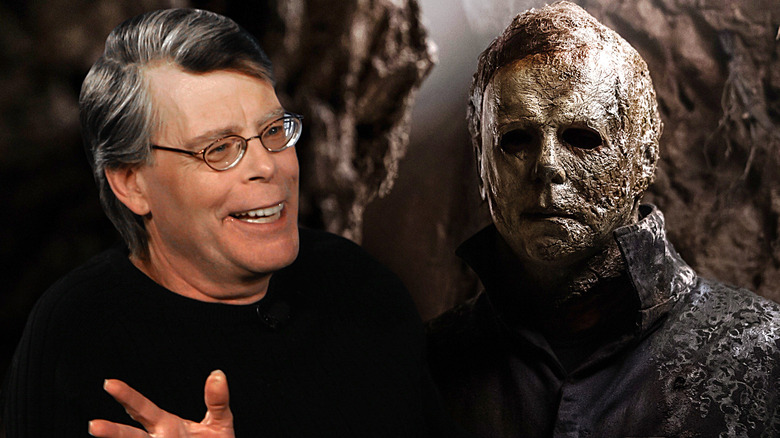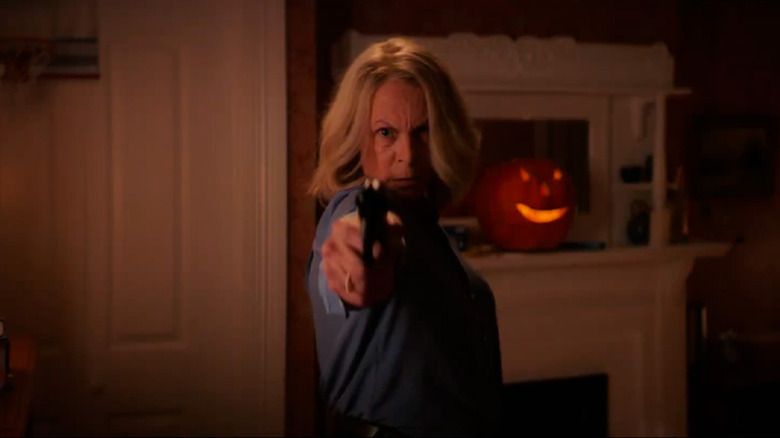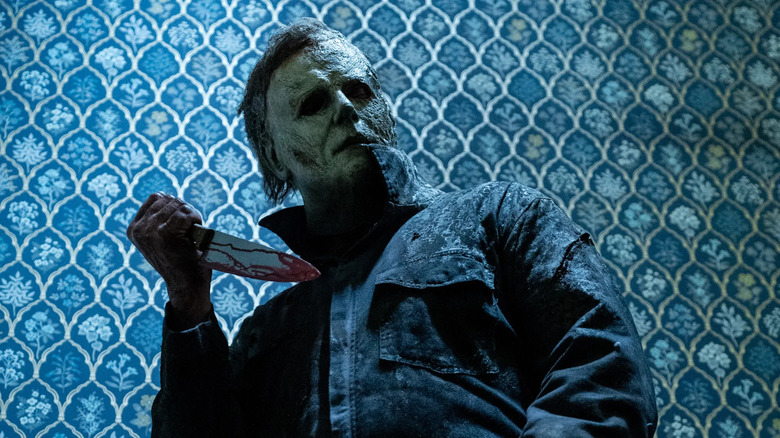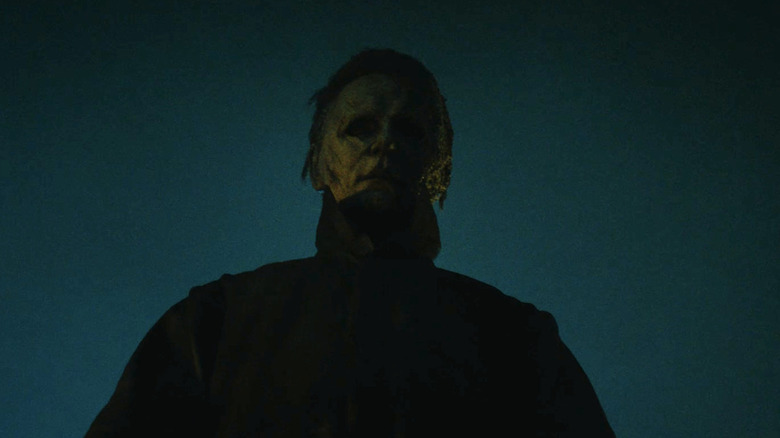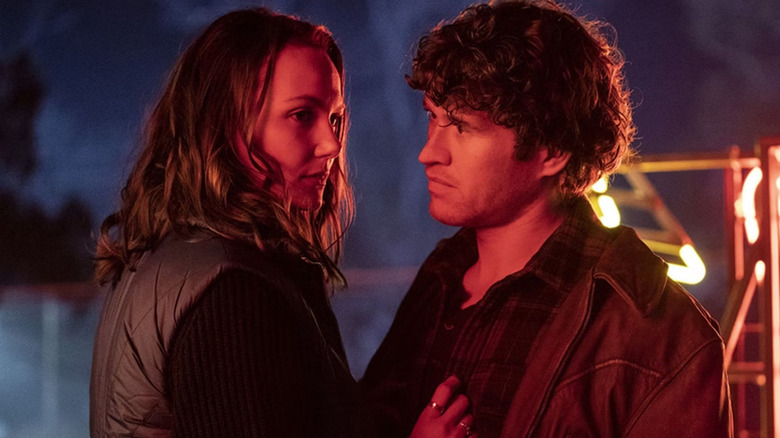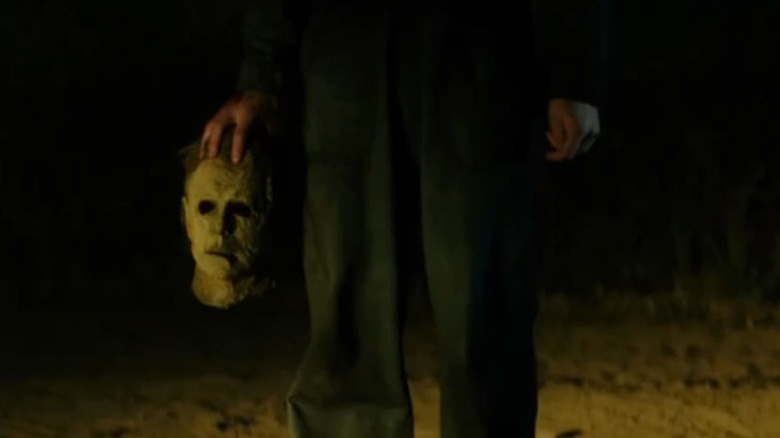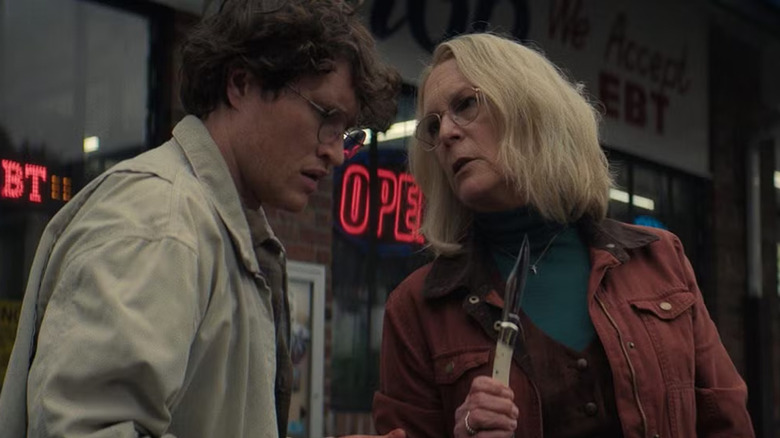Stephen King Liked A Halloween Sequel Most People Hated
What is the legacy of David Gordon Green's "Halloween" reboot trilogy? When the first film, "Halloween," arrived in 2018, fans and even critics were impressed — a dormant franchise was alive again! But then Green would go on to make two more movies, both of which were met with a much more lukewarm reception. The sequel "Halloween Kills" had plenty of gore, but it was also a bit of a mess and not nearly as praised as the 2018 movie. Then came "Halloween Ends." Marketed as the definitive conclusion to the story of Michael Myers and Laurie Strode, "Halloween Ends" was drubbed by both critics and loyal fans. As a result, the general consensus surrounding Green's trilogy these days seems to be negative. But what if I told you that "Halloween Ends" is ... good, actually? In fact, it might even be great. And you don't have to take my word for it! Stephen King, a guy who knows a thing or two about horror, defended the film, writing on Twitter: "I enjoyed HALLOWEEN ENDS. It doesn't reinvent the wheel, but it's–gasp!–surprisingly character driven." He's right, damn it! But we'll get to that in a moment or two. First, a brief history lesson.
John Carpenter's original "Halloween" is not just one of the best horror movies ever made, it's also one of the most financially successful. When that sort of thing happens, producers and studios have only one thing in mind: a sequel. Carpenter wasn't sold on the idea of a sequel, but realizing that the movie would get made with or without him, the filmmaker decided to give it a go. Once again working with writing and producing partner Debra Hill, Carpenter churned out a script for "Halloween II," handing directorial duties over to Rick Rosenthal. "Halloween II" isn't nearly as good as Carpenter's original, but it was another hit. When it came time to make a third film, Carpenter and Hill wanted to change things up. Rather than bring back babysitter murderer Michael Myers yet again, "Halloween III," subtitled "Season of the Witch," was meant to take the franchise into a new direction. The plan was to use the "Halloween" brand to release a new story set against the backdrop of Halloween season.
It was a great idea, and it's fun to imagine a world where it worked out and we got a new Halloween-set anthology film every year for decades to come. Sadly, the plan backfired: audiences wanted more Michael Myers, damn it! And so, by the time the next "Halloween" movie, "Halloween IV," arrived, it was subtitled "The Return of Michael Myers." Michael was back, Carpenter and Hill were gone, and the franchise would continue on, churning out one sequel after another. The series reached its nadir in 2002 with the abysmal "Halloween: Resurrection," a film so bad it pretty much killed the franchise as fans new in. The next "Halloween" movie would be a full-fledged remake and reboot, in the form of Rob Zombie's 2007 movie "Halloween." Reactions were mixed, but Zombie's remake was a big enough hit to warrant a sequel. While this sequel is considered superior to the 2007 remake, it wasn't successful enough to continue on to a third film, though not for lack of trying (there were multiple failed attempts that just never panned out). Instead, the series would lay sleeping for a few years ... only to inevitably come slashing back to life.
Blumhouse teamed up with Universal and Miramax to bring Michael Myers back
After Rob Zombie's "Halloween II," it seemed like the franchise had been stopped in its tracks. But as the saying goes, you can't kill the boogeyman. Rumors for a new "Halloween" movie continued to surface now and again, and finally, in 2016, word broke that the franchise would return, with Blumhouse, Miramax, and Universal Pictures teaming up to resurrect Michael Myers. Directing duties ended up in the hands of indie filmmaker David Gordon Green, who would pen the script with Danny McBride. But the true selling point of the new movie were two returning franchise legends: John Carpenter and Jamie Lee Curtis. Carpenter would serve as executive producer and create the music for the film while Curtis would reprise her role as final girl Laurie Strode.
Getting Carpenter back in any form was a boon, but Curtis' involvement wasn't that novel. After appearing in the first two "Halloween" movies, Curtis left the franchise but returned as an older, more traumatized Laurie Strode in 1998's "Halloween H20." She then had a brief cameo in the aforementioned "Halloween: Resurrection," which saw Laurie seemingly killed off before the opening credits rolled. Now, she was ready to come back one more time, but this new "Halloween" movie was going to be different. Green and McBride cooked up a unique idea: in the world of their new "Halloween" movie, none of the other "Halloween" sequels happened, not even "Halloween II," which picks up mere seconds after the first movie ends. In this new film, only the events of the first "Halloween" took place, and all the confusing mythology was chucked out the window. Laurie Strode was no longer Michael Myers' long-lost sister. There was no Thorn cult. And Busta Rhymes definitely did not fight Michael Myers using half-assed kung-fu moves. This new "Halloween" would be a clean slate.
Halloween 2018 made Michael Myers scary again
Released in 2018, David Gordon Green's "Halloween" was praised by fans and critics alike and became a box office smash. In the movie, we learn that after the events of the first movie, Michael Myers was captured and locked away in an asylum. Forty years have passed, and Laurie Strode, one of the only survivors of Michael's rampage, has spent the last few decades growing more and more alienated from the outside world. A gun-toting survivalist, Laurie remains distant from her daughter Karen (Judy Greer), but seems to have an okay relationship with her granddaughter Allyson (Andi Matichak).
Laurie is still clearly traumatized from the night Michael Myers killed all her horny friends, and she remains convinced that Michael will escape the asylum and come after her. As it turns out, she's half-right. Michael does escape, but he only does so with the help of his deranged doctor, Dr. Ranbir Sartain (Haluk Bilginer). Michael then stalks around Haddonfield brutally murdering people, but in one of the movie's more interesting choices, he doesn't really seem all that interested in Laurie Strode. Michael only ends up at Laurie's secluded house after Dr. Sartain directs him there (and for all his trouble, Dr. Sartain gets his head stomped in like a rotten pumpkin).
The film's big climax is thrilling. Laurie's paranoia has paid off: she's outfitted her home as a kind of giant trap, and after violently battling Michael, she's able to lock him in her basement and set the entire house on fire. Laurie reconnects with her daughter Karen, and she, Karen, and Allyson escape as the house goes up in flames, seemingly taking Michael Myers with it. I have some issues with the film (I'm hate the Dr. Sartain character), but I'm a fan of "Halloween" 2018, and I loved how it made Michael Myers seems scary again. I also loved how the movie seemingly gave Laurie Strode some sort of closure. After decades of living in fear, Laurie slays her boogeyman. In short, I would've been perfectly content had this been a one-and-done movie. But "Halloween" 2018 was too big of a hit for that to happen. And sure enough, word eventually broke that not one but two sequels would be made, with Jamie Lee Curtis set to return for both films. A new trilogy was born, but after the mostly universally warm reception for "Halloween" 2018, things would quickly take a turn.
Halloween Kills was a disappointment after Halloween 2018
The next film in this new trilogy, "Halloween Kills," ran into trouble before it was even released. Originally slated for a summer 2020 release, the film was delayed until October 2021 due to the COVID-19 pandemic. When "Halloween Kills" finally arrived, it was also dropped onto streaming service Peacock the same day it hit theaters. And when audiences finally got a chance to see it, the reaction was less-than-positive. "Halloween Kills" increases the blood and body count, but the film is an uneven mess.
While the concept behind the story — mob rule takes over Haddonfield in the wake of Michael Myers' return — is solid, the execution is lacking. Characters run around shouting "Evil dies tonight!" over and over again, and after having such a strong return in "Halloween" 2018, Laurie spends almost the entirety of the sequel in a hospital bed. This is probably a callback to the original "Halloween II," which also had Laurie incapacitated in the hospital ... but there was no good reason for Green and company to repeat this angle. Fans were excited to have Laurie Strode back — why immediately sideline her like this?
While "Halloween" 2018 felt like it had a pretty definitive ending — Laurie triumphs, Michael burns — "Halloween Kills" leaves the door open for the upcoming third film. After killing seemingly half of Haddonfield, Michael murders Laurie's daughter Karen and the disappears into the night. The implication is clear: the stage has been set for the third and final film, which will bring on the ultimate showdown between Michael Myers and Laurie Strode. But when the third film, "Halloween Ends," finally arrived in 2022, audiences were shocked at the final results, and not in a good way.
Halloween Ends introduces a new main character
While Laurie Strode has a part to playin "Halloween Ends," she's not the main character. Instead, the film focuses on someone we've never met before: nerdy male babysitter Corey Cunningham (Rohan Campbell). Corey has become an outcast in Haddonfield because, as the film's prologue shows us, he accidentally caused the death of a mischievous small boy he was babysitting on Halloween night. The folks of Haddonfield shun Corey, and he's even bullied by a group of kids who are clearly younger than him (in one of the film's most amusing gags, the gang of bullies are a bunch of high school marching band dweebs).
Corey's life changes drastically when he stumbles into a relationship with Allyson, Laurie Strode's granddaughter. The two of them enter into a kind of swooning, doomed outlaw love where they talk about finally getting the hell out of Haddonfield once and for all. Meanwhile, Laurie has changed drastically. No longer a survivalist gun nut, she's now trying to live a happy life and even writing a book about her encounters with Michael Myers. She also finds herself adorably flirting with the local lawman Frank Hawkins (Will Patton). But while Laurie is first sympathetic to Corey — she knows what it's like to be an outcast — she eventually senses a darkness within him. And she's right.
In one of the film's most controversial choices, Michael spends a huge chunk of the runtime down for the count. In an admittedly confusing moment, it's somewhat implied that the evil within Michael has somehow been passed into Corey. I'll confess that I don't think the film sells this angle particularly well, but I still am able to go along with it. Corey is a tragic figure, a loser who goes over the edge and begins to brutally murder people who get in his way, wearing Michael's infamous mask as he goes on his killing sprees. Allyson remains oblivious to this, and balks when Laurie tries to warn her that Corey is bad news. Eventually, Michael finally gets back on his feet. He kills Corey and engages in one final fight with Laurie. There's a moment where it looks like Michael will have the upperhand and kill Laurie once and for all, but Allyson arrives on the scene to save the day. Laurie slits an incapacitated Michael's throat, and then she and seemingly the entire town of Haddonfield take Michael's corpse to the local junkyard, where the body is tossed into an industrial shredder.
Halloween Ends tried something different, and audiences didn't like that
Before we go any further, let me just say: I get it. I get why people hate "Halloween Ends." This new trilogy was sold as Laurie Strode's story. This was supposed to be a series that brought back the character and gave her some sort of epic conclusion. "Halloween" 2018 kept Laurie front and center. "Halloween Kills" sidelined her for a bit, but ended with a set-up for the grand finale: Michael killed Laurie's daughter and Laurie was ready for revenge. But then "Halloween Ends" came along and essentially said, "We're going to forget about that stuff and tell a completely different story." It's a bait-and-switch scenario, and I completely understand why so many viewers were turned off by that. But here's the thing: if you can move beyond that, you might find "Halloween Ends" to be one of the most interesting "Halloween" sequels ever made. The fact that it tries to do something new with familiar material is the film's strength, not its weakness. And as Stephen King rightly pointed out, the movie takes its time to develop compelling characters, something unique for slasher sequels.
Corey is a fresh character for the series, and I particularly love the way the movie plays on our sympathies for him. As the film begins, Corey is likable, but the time we reach the climax, Corey has become a loathsome, bloodthirsty psychopath. He's like an embodiment of incel rage; the type of loner loser who doesn't know how to fit into society, and takes his self-loathing out on everyone around him. While the film is somewhat murky about Corey's motivations — is the evil within Michael Myers some sort of supernatural force that gets passed out of his body into Corey's only to then end up back in Michael's body for the big finale, or is Corey just bad news from the jump? — I found myself engrossed in his story, and in the moody romance that blooms between Corey and Allyson.
It's true that the film seems to forget about Laurie for large chunks of its runtime, but Laurie still gets plenty of spotlight. I particularly love the cute, clumsy flirations between Laurie and Hawkins. Sure, the Laurie here seems vastly different from the Laurie we met in the 2018 film, but that's kind of the point. And in the end, Laurie gets her closure, killing her boogeyman and moving on. The original "Halloween" ends with a series of shots of various dark rooms with the heavy breathing of Michael Myers heard on the soundtrack, the implication being that Michael Myers is now anywhere and everywhere. In one of the most brilliant moments of "Halloween Ends," Green wraps things up in a similar but distinctly different way. Once again, we're treated to a series of shots of various rooms, but these rooms are brightly lit by the sun, and instead of the heavy breathing of Michael Myers, the only sound is birdsong. Michael is really gone. It's a hopeful, lovely ending. But it seems like none of this is what audiences wanted.
Halloween Ends deserves a reappraisal
Again: I understand why this didn't go over so well. Fans expected the final Laurie Strode/Michael Myers showdown, not the Corey Cunningham story. But I genuinely believe that one day folks will come around on "Halloween Ends." Audiences who once shunned "Halloween III: Season of the Witch" came to appreciate the film for its uniqueness, and I think the same thing is going to happen with "Halloween Ends." Of the three films in Green's trilogy, "Ends" is the entry I find myself revisiting the most. Sure, if you want the same old story about Michael Myers stalking around town killing teens, you might be disappointed. But here's the thing: there's already an entire franchise filled with movies like that. Michael Myers has been stalking the streets of Haddonfield for decades, and those movies are fun. But is trying something new with the franchise really such a crime?
"Halloween Ends" feels it has more on its mind than the usual stalk-slash-kill scenario present in almost all of the other "Halloween" films. "Ends" arrived after the peak of the COVID-19 pandemic, and you have to assume that played a part in how Green and his team of writers cooked up their story, as they treat evil as a kind of infectious disease. And while "Halloween KIlls" has an entire storyline about mob mentality, "Ends" does a much better job of portraying Haddonfield as a place of bland suburban group-think. Both Corey and Laurie are shunned, blamed by the townsfolk for things out of their control. And in the end, the townsfolk are happy to take justice into their own hands and grind Michael Myers' body into goo. There's no sense of justice here, just an urge to meet the spilling of blood with more blood. It's an Old Testament approach.
Green also loads "Halloween Ends" up with plenty of gnarly horror movie moments. When Corey goes full-psycho, his kills are particularly gruesome, like when he cuts out the tongue of a rude DJ. And a moment where Corey blasts a blowtorch into the screaming mouth of one his bullies is one of the most brutal kills in the entire franchise. There's so much here for audiences to embrace, and yet the reaction was almost overwhelmingly negative. But again: time will tell. It's only been two years since "Halloween Ends" arrived. When we hit the 5 year mark, or perhaps the 10, I have a feeling more reappraisals will start trickling in. Sooner or later, Michael Myers will live to kill again (there's currently a "Halloween" TV series in the works), but I'm glad we got David Gordon Green's trilogy, and I'm glad we got "Halloween Ends," because it's proof that you can teach an old horror franchise new tricks.
